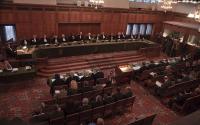Tribunals

Quicktabs: Keywords

The authors argue that ratifying the United Nations Convention on the Law of the Sea would jeopardize U.S. counterterrorism efforts by placing them under the control of unaccountable tribunals.
[ More ]Deputy Secretary of State John D. Negroponte and Deputy Defense Secretary Gordon England maintain that the convention will enhance U.S. security. They argued in the Washington Times last monthReap the bounty — John D. Negroponte and Gordon England. — Washington Times — Jun 12, 2007 [ More ] that to meet the "complex array of global and transnational security challenges," the United States must have "unimpeded maritime mobility -- the ability of our forces to respond any time, anywhere, if so required."
This is true, but ratifying the convention won't bring this benefit. Instead it would put America's naval counterterrorism efforts under the control of foreign judges. Suppose the United States seizes a vessel it suspects of shipping dual-use items that might be utilized to build weapons of mass destruction or other tools of terrorism. It's not a wild supposition. Under the Proliferation Security Initiative, the United States has since 2003 secured proliferation-related high-seas interdiction agreements with countries such as Belize and Panama, which provide registration for much international shipping. If the United States ratifies the Convention on the Law of the Sea, the legality of such seizures will, depending on the circumstances, be left to the decision of one of two international tribunals.
The first is the International Tribunal for the Law of the Sea, based in Hamburg. Some members of the Hamburg tribunal come from countries naturally suspicious of American power, such as China and Russia. Others are not allied with the United States. Even judges from Europe and South America do not always see things the way U.S. military authorities do.
The second institution is a five-person international arbitration panel. The United States and the flag state of the seized ship would have input into the selection of some of these arbitrators. But the U.N. secretary general or the president of the Hamburg tribunal would select the crucial fifth arbitrator when, as would typically be the case, the state parties cannot agree. They must choose from a list of "experts" to which every state party to the convention -- not just China and Russia but other unfriendly nations such as Cuba and Burma -- can contribute.
There are even more complex problems. UNCLOS sets up a special law of the sea tribunal with jurisdiction to interpret provisions of the Convention that apply equally to military and non-military uses of the sea. Although military uses can be excluded from the purview of the tribunal by particular states on ratifying the UNCLOS (article 298.1.b), a decision interpreting the UNCLOS's language relating to "innocent passage" or "transit passage" through straits, even if rendered in a case involving only non-military activities, would necessarily apply also to military uses. The distinction between military and non-military application of the tribunal provisions is thus untenable. Moreover, even if the United States and other naval powers take advantage of this available exclusion, nothing they do can stop other states from having their own military activity adjudicated by the tribunal. Despite the fact that the tribunal's decision binds only the parties before it, the tribunal's interpretation of a provision of the UNCLOS that applies equally to all parties affects international correspondence in ways potentially disastrous to American naval power.
